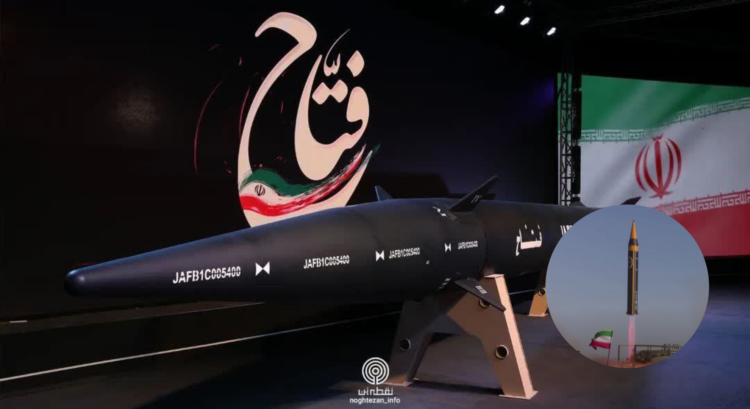Despite receiving warning and sanction threats from the West to deter Iran from pursuing its hypersonic missile program, the country has boldly defied these measures and unveiled its latest achievement in the global arms race: the Fattah hypersonic missile. This display of technological prowess showcases Iran’s determination to advance its military capabilities despite international pressure. The weapon, known for its incredible speed and maneuverability, poses a significant challenge to existing defense systems and raises fears of their potential use in delivering nuclear or other weapons of mass destruction.
Tehran recently revealed its first hypersonic missile, dubbed Fattah, which it claims can travel at speeds of up to Mach 15 and breach current defense systems, escalating concerns for Western nations and Israel.
As you all know, Israel and Iran have been at odds for decades, and their relationship has only worsened in recent years, with the latter repeatedly threatening to destroy the former. The development of the Iranian hypersonic missile only adds a new dimension to Tehran’s military capabilities, and while it has not confirmed whether the Fattah missile is nuclear-capable, its history with a controversial nuclear program has heightened apprehensions regarding its intentions.
FATTAH – Iranian hypersonic missile. Note the sustainer rocket motor of the RV. pic.twitter.com/5IF817ytH7
— Tal Inbar (@inbarspace) June 6, 2023
Furthermore, Iran doesn’t exactly have a clean track record when it comes to deploying its lethal weapons in regional conflicts and engaging in proxy warfare. The country has long earned a reputation for actively providing military support to various non-state actors and insurgent groups across the Middle East, including Hezbollah in Lebanon, the Houthis in Yemen, and militias in Iraq and Syria. Its willingness to employ its weapons in these conflicts has heightened regional tensions and raised the alarm among neighboring countries and international actors. Despite sanctions, Iran reportedly supplied armed kamikaze drones to Russia, further bolstering Moscow’s capabilities in its ongoing invasion campaign in Ukraine.
With claims of finally having its own hypersonic missiles, should the West be more concerned about this? Probably so.
Fattah: A Game-Changer in Iran’s Arsenal
According to multiple reports, the Fattah missile, showcased by the Islamic Revolutionary Guard Corps (IRGC), boasts an impressive range of 1,400km (870 miles) and can achieve speeds of up to Mach 15 (5.1 km or 3.2 miles per second). It incorporates advanced features such as a moveable secondary nozzle and solid fuels, enabling high maneuverability within and beyond the atmosphere. In contrast, the fictional Darkstar flown by Tom Cruise in Top Gun: Maverick was “only” capable at flying at Mach 10.
Iranian officials assert that no existing missile defense system can effectively counter the Fattah, signaling a significant leap in missile technology and enhancing Iran’s deterrence capabilities.
The specifications of the Iranian homegrown hypersonic missile ‘Fattah’ pic.twitter.com/Qa5an0AnIU
— Press TV 🔻 (@PressTV) June 6, 2023
The unveiling of the Fattah reveals Iran’s ambitious pursuit of hypersonic missile technology alongside other superpowers. Its participation would now only heighten the already intensified hypersonic missile race, thus causing more stir in strategic stability.
While the missile’s maneuverability and advanced propulsion system pose challenges for conventional defense systems, the actual effectiveness of Iran’s hypersonic ballistic missile remains to be seen. Footage of a successful launch and target strike was not released, emphasizing the need for further verification of its capabilities.
Hopping on the Arms Race Bandwagon
Hypersonic missiles are a new breed of weapons that travel at speeds exceeding Mach 5, or five times the speed of sound. Their unparalleled speed and maneuverability pose significant challenges for conventional defense systems, which makes them a sought-after weapon.
These missiles use advanced propulsion systems and cutting-edge technologies to enable rapid and precise strikes against targets. With their ability to fly within and outside the atmosphere, hypersonic missiles offer increased operational flexibility and can potentially overcome existing defense mechanisms.
Russia took the lead in 2021 in the race for hypersonic missiles, followed by China’s successful flight test of its hypersonic glide vehicle in 2022. Since then, the United States has faced immense pressure to develop its own hypersonic capabilities and has been actively working on them for several years. Despite being slightly behind, recent development and testing show promising results for the US as the third contender.
North Korea has also joined the hypersonic missile race, claiming to have flight-tested its own in 2021. However, no independent source could have attested that Pyongyang succeeded in this pursuit.
Should Israel and the West Be Concerned?
The introduction of the Fattah raises concerns for both Israel and Western nations, particularly in the context of regional security dynamics. Israel, Iran’s main rival in the Middle East, possesses robust air defense systems such as the Iron Dome and Arrow missile defense system. However, it will now need to assess the Fattah’s maneuverability and the effectiveness of its defenses against this advanced missile.
Meanwhile, Western countries, including the United States, have to keep a close eye on Iran’s military advancements and evaluate their impact on regional stability. The Fattah’s capabilities could potentially complicate defense strategies and necessitate proactive measures to address emerging threats.
To conclude, Iran’s unveiling of the Fattah hypersonic missile represents a significant milestone in its development of missile technology. While the exact capabilities of the lethal projectile are yet to be verified, its potential to penetrate defense systems and the resulting concerns for Israel and the West demand attention.
As global military dynamics continue to evolve, monitoring and assessing the impact of hypersonic missile technology is crucial to maintaining regional stability and security.
—
“War at the Speed of Light” delves into the groundbreaking and rapidly expanding realm of directed-energy weapons, encompassing laser, microwave, electromagnetic pulse, and cyberspace weapons, and their transformative impact on modern warfare.










COMMENTS